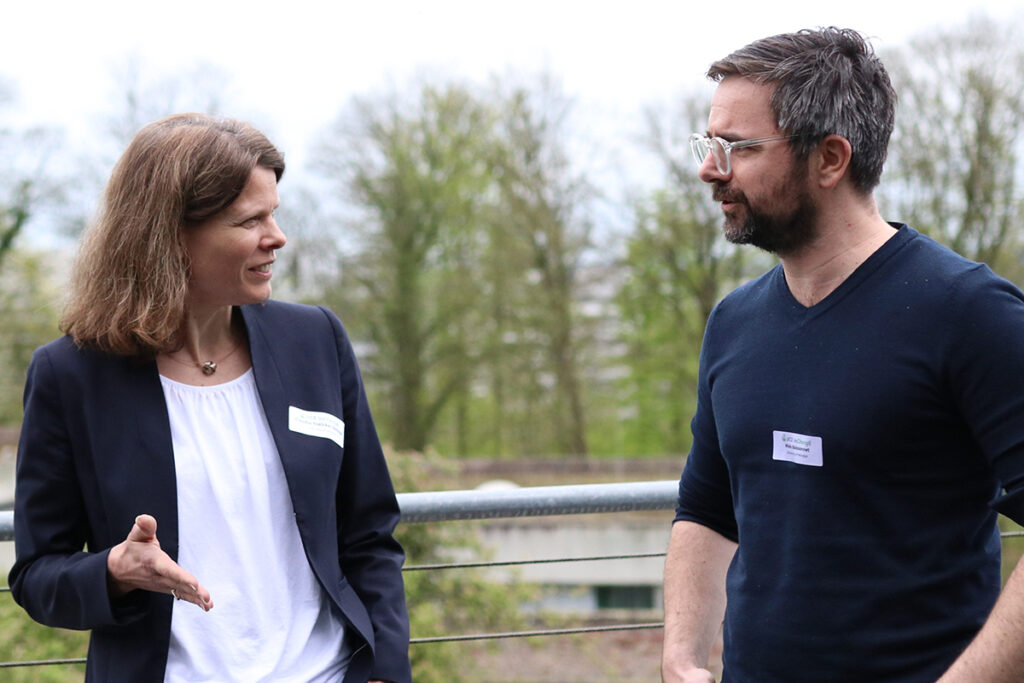What does a science of individualization need? Researchers from the natural sciences, humanities, and social sciences provided insights into this at the third symposium on individualization hosted by the JICE Institute, which is supported by Bielefeld University and the University of Münster. It was held at the Center for Interdisciplinary Research (ZiF) on the Bielefeld campus. In this interview, Münster sports scientist Professor Dr Claudia Voelcker-Rehage and Bielefeld economist Dr Niels Boissonnet explain what makes the institute’s interdisciplinary approach so valuable for their research. They explain how the focus on individualization enables innovations in a wide range of areas—from optimizing performance in sport to ethical questions of resource distribution.
Ms Voelcker-Rehage, what prompted you to get involved in the JICE with your research? What makes the JICE research approach so valuable for your work?
Voelcker-Rehage: The JICE takes an interdisciplinary approach. In my view, interdisciplinary research is very valuable, because it encourages us to think outside the box and this, in turn, reveals new perspectives and research approaches for our own research. The uncomplicated and productive exchange with other disciplines at JICE is unique. This applies both to the exchange of research and evaluation methods and to analogies, parallels, and similarities across different species.
Mr Boissonnet, you joined the JICE as a postdoctoral researcher in the InChangE project. How does your research benefit from being part of the JICE?
Niels Boissonnet: In the social and life sciences, the concept of the individual is so fundamental that it leads to seemingly insurmountable controversies and misunderstandings. The JICE’s focus on individualization provides a highly interdisciplinary framework in which to address these challenges in a nuanced and complex way. Recently, the economic sciences embarked on a significant revision of their concept of the individual in order to recognise the latter as a product of the environment. It is extremely enriching to see how other disciplines tackle this problem. Specific treatments such as personalized medicine can also be better understood.

© Bielefeld University
Ms Voelcker-Rehage, you spoke at the conference about individual differences in human performance across the lifespan. What factors cause differences in people’s performance?
Voelcker-Rehage: There are a number of different factors that lead to individual differences in performance such as genetics, life experiences and styles, preferences, knowledge about the importance of exercise for one’s own health, motivation, and personality. Training programmes can be adapted to individual differences in various ways. From a physiological perspective, the main aim is to adapt training programmes to individual performance and physical requirements. However, this does not guarantee that a programme will be followed. Other individual factors also need to be considered, such as preferences in the form of delivery—digital or non-digital, gamified or not—or whether there are certain forms of exercise that individuals prefer, which are then offered to them during training.

© Bielefeld University
In sport, it is often a question of combining individual requirements with targeted training methods and personalized coaching. Can you draw parallels here with other areas of life? What findings from your area of expertise have overarching significance for individualization research?
Voelcker-Rehage: There is a long tradition of individualization in sport. As a rule, training is generally based on certain principles that adapt the type, intensity, scope, and frequency of workouts to individual requirements. We now know that this form of individualization is still too broad because, for example, physiological requirements such as gender differences are not sufficiently considered. At the same time, this type of individualization can also be easily transferred to other areas. Individualization is essential in both prevention and therapy. We are also exploring the significance of lifestyle factors for the ageing process. This is also of great importance for approaches to individualization in other scientific fields.
Mr Boissonnet, at the conference, you presented your research on the fair distribution of resources under risk conditions. What can be done to strike a balance between individualization and fair risk assessment in society?
My study is about proposing a framework that makes it possible to ethically justify a particular wealth and risk distribution scheme by allowing for individual characteristics. Some individuals are more inclined to choose risky behaviours for their well-being or health than others. Should we prevent this or correct the consequences? To give a more specific example: should we penalise unhealthy lifestyles, make universal health insurance compulsory, or go for something in between? If risky behaviours are ignored, this can lead to inequalities in favour of those who were daring and lucky. However, preventing risks or completely redistributing their consequences infringes individual sovereignty. We suggest a solution in the form of a lottery allocation based on the certainty equivalents of individuals. By this we mean that the lottery allocated to an individual is evaluated according to the minimum amount of money they would like to receive for certain in exchange for taking this risk. This promotes greater equality, especially in times of crisis.

© Bielefeld University
Risk distribution is a key topic in economics. How could this concept be illuminating for other disciplines with regard to individualization processes?
In my study, the question of risk distribution arises in the context of ethical evaluation. It is therefore relevant for all academic disciplines that take a normative approach, such as philosophy and medicine. It also challenges public decision-makers and citizens in general, as debates on the Covid-19 pandemic have shown. For example, in many countries the question has been raised as to how to balance health risks for older people against economic risks for younger people. A better understanding of how economists approach this issue might have led to fairer solutions. Examining how individuals share risks in groups can also be enlightening from an evolutionary perspective. This is where economists could help to define the conditions for reasonable unequal risk distributions.




